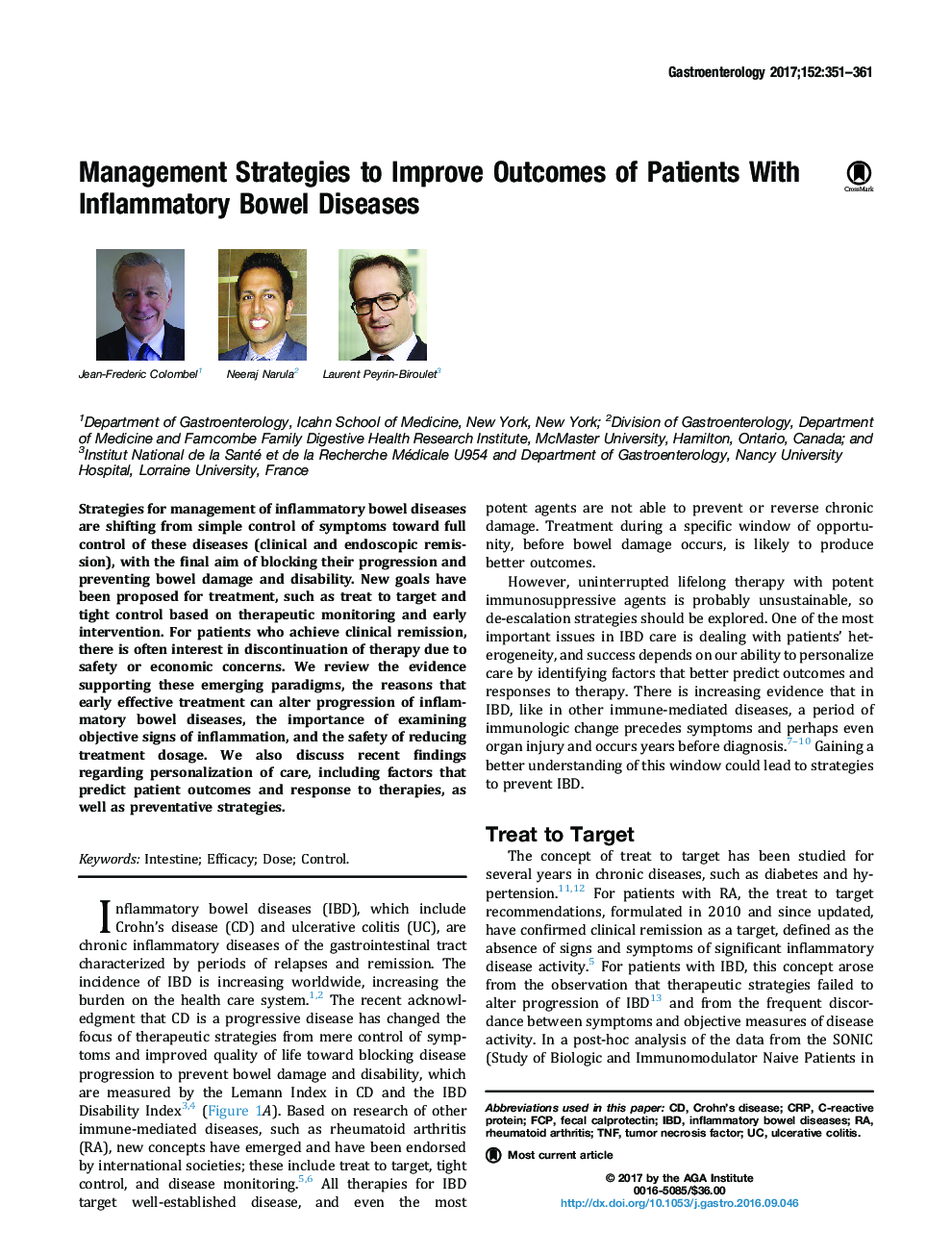| کد مقاله | کد نشریه | سال انتشار | مقاله انگلیسی | نسخه تمام متن |
|---|---|---|---|---|
| 5658305 | 1407431 | 2017 | 16 صفحه PDF | دانلود رایگان |
عنوان انگلیسی مقاله ISI
Management Strategies to Improve Outcomes of Patients With Inflammatory Bowel Diseases
ترجمه فارسی عنوان
استراتژی های مدیریتی برای بهبود نتایج بیماران مبتلا به بیماری های التهابی روده
دانلود مقاله + سفارش ترجمه
دانلود مقاله ISI انگلیسی
رایگان برای ایرانیان
کلمات کلیدی
IBDFCPTNFRheumatoid arthritis - آرتریتروماتوئیدEfficacy - اثرinflammatory bowel diseases - بیماری های روده ای التهابیCrohn’s disease - بیماری کرونDose - دوز Intestine - رودهtumor necrosis factor - فاکتور نکروز تومورC-reactive protein - پروتئین واکنشی سیCRP - پروتئین واکنشی سی یا سی. آر. پی Fecal calprotectin - کالپروتکتین مدفوعControl - کنترلUlcerative colitis - کولیت اولسراتیو
ترجمه چکیده
استراتژی های مدیریت بیماری های التهابی روده از کنترل ساده علائم برای کنترل کامل این بیماری ها (بهبودی بالینی و اندوسکوپی)، با هدف نهایی جلوگیری از پیشرفت آنها و جلوگیری از آسیب و معلولیت روده تغییر می کند. اهداف جدید برای درمان، مانند درمان با هدف و کنترل شدید بر اساس نظارت بر درمان و مداخله اولیه پیشنهاد شده است. برای بیمارانی که به بهبودی بالینی رسیده اند، اغلب علاقه ای به قطع درمان به علت نگرانی های ایمنی یا اقتصادی وجود دارد. ما شواهدی را که از این پارادایم های در حال ظهور حمایت می کنیم، بررسی می کنیم، به این دلیل که درمان موثر زودهنگام می تواند پیشرفت بیماری های التهابی روده را تغییر دهد، اهمیت بررسی علائم عینی التهاب و ایمنی کاهش دوز درمان. ما همچنین در مورد یافته های اخیر در مورد شخصی سازی مراقبت، از جمله عوامل پیش بینی نتایج بیماران و پاسخ به درمان ها، و نیز استراتژی های پیشگیرانه، بحث می کنیم.
موضوعات مرتبط
علوم پزشکی و سلامت
پزشکی و دندانپزشکی
بیماریهای گوارشی
چکیده انگلیسی
Strategies for management of inflammatory bowel diseases are shifting from simple control of symptoms toward full control of these diseases (clinical and endoscopic remission), with the final aim of blocking their progression and preventing bowel damage and disability. New goals have been proposed for treatment, such as treat to target and tight control based on therapeutic monitoring and early intervention. For patients who achieve clinical remission, there is often interest in discontinuation of therapy due to safety or economic concerns. We review the evidence supporting these emerging paradigms, the reasons that early effective treatment can alter progression of inflammatory bowel diseases, the importance of examining objective signs of inflammation, and the safety of reducing treatment dosage. We also discuss recent findings regarding personalization of care, including factors that predict patient outcomes and response to therapies, as well as preventative strategies.
ناشر
Database: Elsevier - ScienceDirect (ساینس دایرکت)
Journal: Gastroenterology - Volume 152, Issue 2, January 2017, Pages 351-361.e5
Journal: Gastroenterology - Volume 152, Issue 2, January 2017, Pages 351-361.e5
نویسندگان
Jean-Frederic Colombel, Neeraj Narula, Laurent Peyrin-Biroulet,
